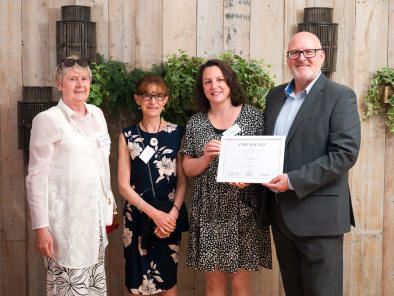May 03, 2020
Your guide to mindfulness
It can be easy to rush through life without stopping to notice much, especially during times of heightened stress and anxiety.
Paying more attention to the present moment, your own thoughts and feelings and to the world around you can help improve your mental wellbeing.
This week, we caught up with Senior Treatments Manager, Hannah, for an introduction to mindfulness and how you can take steps to develop it in your own life:
“The world today seems to be going by at a fast pace; not only are we doing more, but our minds are more active than ever – forever expanding with new knowledge and ideas. In order to cope with all this information, we need to slow down and take stock. If we rush about, either physically, mentally, emotionally or even spiritually, we will hit a breakdown at some point. We are ‘human beings’ not ‘human doings’ – the clue is in the name!
“Now more than ever, we need to be aware of all that we do; see the behaviours that we have learnt and become stuck in and be aware of how we feel in EVERY MOMENT. Many refer to this awareness as ‘mindfulness’, and it can help us enjoy life more and understand ourselves better.
“Being present in oneself and taking a step back occasionally is the key to a pleasant and relaxed journey through life. If we don’t stop to notice, we’re going to miss some of our lessons in life, but we’re also going to miss the beauty that there is around us.
“For some of us we need to learn how to live! This sounds like a simple thing to say but in reality, it can be quite a challenge. Patterns of past conditioning, habits and behaviours wedge themselves inside us (physically, mentally, emotionally and spiritually) and start to shape us and our future. By stepping back and looking at ourselves and our environment, we can become more mindful, our senses become more heightened and we become more in control of our direction and choices.
So, what is mindfulness and how do I practice it?
“Mindfulness comes from an Indian word called ‘Sati’ which means awareness, attention and remembering. It is about being in the present moment, not reacting automatically, being non-judgemental, being openhearted and practising the art of observation.
“Mindfulness helps you to accept who you are and how you feel and can help you to relax by releasing stress and anxiety. This can be done by simply accepting feelings when they come up by just being with them, sitting with them and allowing them to flow, and accepting that these are just feelings, and that they will start to dissipate as you relax. By allowing feelings to be there rather than fighting them or thinking that you don’t want these feelings with you, you will find that gradually, they will disappear.
“Being mindful can help with productivity. Something that I personally struggle with is distraction; when I am doing a task, something will catch my eye and I will focus on that rather than the task in hand.
“As I write this blog, I am completely focused on the task of writing; I am aware of what is around me, but I am not allowing it to distract me. If I do become distracted, I mindfully bring my focus back – not becoming angry at myself for letting my mind wander, just accepting that it happened, and gently bringing myself back to the task. By keeping focused on one task you are more likely to do it really well, and also quicker!
“Body scan meditation is a great way to start to bring your awareness back to your body and out of your head and help release tension you might not even realise you’re experiencing. Sometimes we can be so caught up in our own lives we fail to recognise the physical discomfort we’re experiencing—such as headaches, back and shoulder pain, and tense muscles—is connected to our emotional being.
“Body scanning involves paying attention to parts of the body in a gradual sequence from feet to head. Find a comfortable place to lie down and let your body fully relax into the floor. Close your eyes and mentally scan yourself. By doing this you are bringing awareness to every single part of your body, noticing any aches, pains, tension, or general discomfort. The goal is not to relieve the pain completely, but to reintroduce us to how our body feels and how we can better look after it, simply by listening to it.
“Mindfulness is also a great way to help brain chatter dissipate, allowing our thoughts to stay in the background and you to stay present. If something goes wrong in our day, we may tell ourselves how silly we were to let it happen and replay the moment over and over again in our head. A mindful approach to tackling these occurrences is to accept what has happened, learn from it and move on.
“I hope this has given you some food for thought on adopting a more mindful approach to your daily life. Stay tuned for my next blog on mindful exercises, coming soon!”
More Ragdale News
Ragdale Hall Community Chest Awards Night 2025
Jun 30, 2025
As an independent family run business we are proud to be part of the local community with…
Ancient + Brave
Jun 30, 2025
We reached out to Jenni Kiddle, Nutrition Executive at Ancient + Brave, who shared her…
Ragdale Hall Spa awarded ‘Best Spa for Wellness’.
Jun 25, 2025
We are delighted to announce that we have been awarded ‘Best Spa for Wellness’ in the…








Leave a Reply